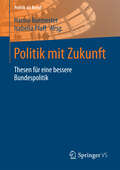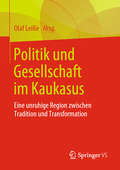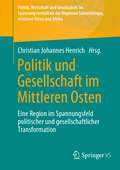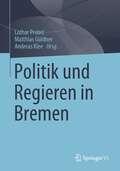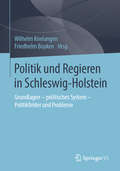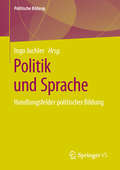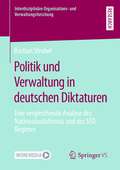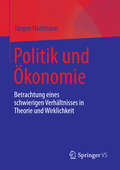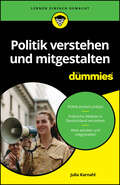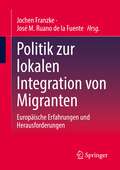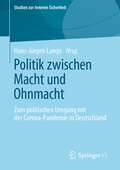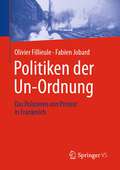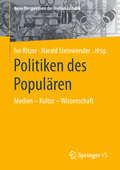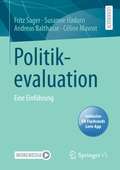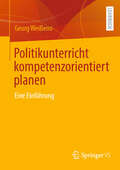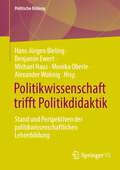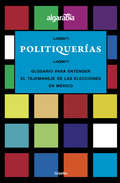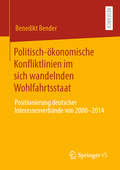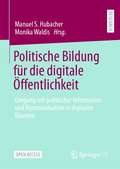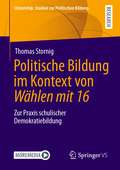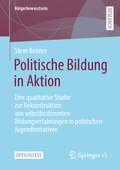- Table View
- List View
Politik mit Zukunft: Thesen für eine bessere Bundespolitik
by Hanno Burmester Isabella PfaffDie deutsche Politik zerreibt sich im Spagat zwischen zunehmend protestbereiten Wählern vor Ort und der Anforderung, hyperkomplexe Probleme auf europäischer und globaler Ebene lösen zu müssen. Dadurch erodiert das Ansehen von Politik und Parteien - eine Bewegung, die letztlich demokratiegefährdend ist. Die in der Nachkriegszeit ausgeprägten Mitwirkungs- und Entscheidungsmechanismen der Bundesrepublik werden zunehmend in Frage gestellt; sie scheinen den Wählerbedürfnissen und Herausforderungen des 21. Jahrhunderts nicht mehr gerecht zu werden. Das Ergebnis: die Politik wird abgehängt. Dieses Buch ist ein leidenschaftliches Plädoyer für gute Politik - und die Voraussetzungen, die man für ihre Renaissance schaffen muss. In dreizehn streitbaren Thesen benennen Kenner des politischen Berlins offen die Schwächen des bundespolitischen Betriebs und zeigen, was sich ändern muss, um den Ansehensverlust der Politik zu stoppen. Dabei richtet sich der Blick nicht nur auf Politiker selbst, sondern auch auf die anderen Steuermänner des "Raumschiffs Berlin": Journalisten, Beamte, Berater und Mitarbeiter.
Politik und Gesellschaft im Kaukasus: Eine unruhige Region zwischen Tradition und Transformation
by Olaf LeißeDer Band nimmt eine umfassende Bestandsaufnahme der gegenwärtigen Lage der Kaukasus-Region vor. Er gibt einen breiten Überblick über die innenpolitische und gesellschaftliche Situation in Aserbaidschan, Armenien und Georgien, behandelt zugleich aber auch länderübergreifende Themen und nimmt die Politik der angrenzenden Staaten sowie der Europäischen Union in den Blick. Auf diese Weise entsteht ein komplexes Bild einer vielfältigen, jedoch politisch, sozial und militärisch instabilen Region. Deutsche und einheimische Wissenschaftler erarbeiten Zukunftsperspektiven für eine Region zwischen Tradition und Transformation.Der InhaltPolitik im Südkaukasus • Soziale Entwicklung und Minderheiten • Die Kaukasus-Region im außenpolitischen Fadenkreuz • AusblickDer HerausgeberDr. Olaf Leiße ist außerplanmäßiger Professor für Europäische Studien am Institut für Politikwissenschaft der Universität Jena.
Politik und Gesellschaft im Mittleren Osten: Eine Region im Spannungsfeld politischer und gesellschaftlicher Transformation (Politik, Wirtschaft und Gesellschaft im Spannungsverhältnis der Regionen Südosteuropa und Mittlerer Osten)
by Christian Johannes HenrichIn diesem Sammelband werden die historischen, politischen und gesellschaftlichen Facetten der politischen Systeme der einzelnen Länder des Mittleren Ostens analysiert. Auch die Transformationsprozesse in den Gesellschaften im Kontext des Arabischen Frühlings, des Krieges in Syrien, des Bürgerkriegs in Libyen oder des Putsches in Ägypten spielen eine zentrale Rolle. Ebenfalls wird Israel beleuchtet, das als unvollständige Demokratie der einzige Hoffnungsschimmer im Umfeld zahlreicher autoritärer und totalitärer Systeme ist. Die Region ist zudem aufgrund der energiepolitischen Abhängigkeit sehr wichtig für die Europäische Union.
Politik und Regieren im Saarland
by Felix HörischDas Saarland verfügt als jüngstes westdeutsches Bundesland über eine wechselhafte und spannende Geschichte. Dabei ist der (bundes-)politische Einfluss des nach der Bevölkerungszahl zweitkleinsten Bundeslands nicht zu unterschätzen. So verfügt das Saarland nicht nur über die höchste Parteimitgliederdichte aller Bundesländer, sondern hat auch zahlreiche Politiker von bundespolitischer und -historischer Bedeutung hervorgebracht. Darüber hinaus steht es als (ehemaliges) traditionelles Kohle-, Stahl- und Industrieland mitten in einem bedeutsamen Transformationsprozess, den es u.a. als Teil der Großregion mit der höchsten grenzüberschreitenden Mobilität von Arbeitnehmer*innen innerhalb der Europäischen Union zu meistern versucht. Der Sammelband analysiert die Geschichte des Saarlands ebenso wie die Entwicklung des Parteiensystems und der Landesregierungen wie auch die Verortung des Saarlands in verschiedenen Politikfeldern im Vergleich.
Politik und Regieren in Bremen
by Lothar Probst Matthias Güldner Andreas KleeDieses Buch ist die erste umfassende Darstellung des Bremer Institutionensystems, der politischen Akteure, der politischen Kultur und der Wahlen auf den verschiedenen Ebenen des politischen Systems. Die Beiträge analysieren dabei Aspekte wie die Stellung des Landes im Bund und in der Europäischen Union, die Rolle der Senatspräsidenten und ihrer Führungsstile, die Interessenorganisationen und Protestbewegungen, die Bremer Medienlandschaft und arbeiten auch ausgewählte Aspekte der Landespolitik wissenschaftlich heraus.
Politik und Regieren in Schleswig-Holstein: Grundlagen - politisches System - Politikfelder und Probleme
by Wilhelm Knelangen Friedhelm BoykenDer Band stellt das politische System von Schleswig-Holstein dar. Die historischen, gesellschaftlichen und ökonomischen Grundlagen des Regierens und die politische Kultur im nördlichsten deutschen Bundesland werden analysiert. Das politische System Schleswig-Holsteins und seine zentralen Institutionen werden ebenso vorgestellt wie ausgewählte Politikfelder. Der Inhalt Schleswig-Holstein als politikwissenschaftliches Thema · Historische Grundlagen: Von Schleswig und Holstein zu Schleswig-Holstein · Gesellschaftliche Grundlagen der Politik · Ökonomische Grundlagen: Wirtschaft und Wachstum · Pathologien der politischen Regionalkultur· Verfassung und Verfassungsgericht · Landesregierung: Staatskanzlei und Ministerien · Der Schleswig-Holsteinische Landtag und der Landesparlamentarismus · Wahlsystem, Wahlen und Parteiensystem in Schleswig-Holstein · Kommunalpolitik in Schleswig-Holstein · Medien und Medienpolitik in Schleswig-Holstein · Kulturpolitik in Schleswig-Holstein · Bildungs- und Forschungspolitik in Schleswig-Holstein · Wasserpolitik in Schleswig-Holstein · Minderheitenpolitik in Schleswig-Holstein · Nordstaat – Norddeutschland – Echter Norden Die Zielgruppen · Studierende und Lehrende der Politik- und Sozialwissenschaften sowie benachbarter Fächer · Politisch interessierte Personen Die Herausgeber Dr. Wilhelm Knelangen ist Professor für Politikwissenschaft am Institut für Sozialwissenschaften der Christian-Albrechts-Universität zu Kiel. Dr. Friedhelm Boyken ist Ministerialbeamter in der Staatskanzlei des Landes Schleswig-Holstein und Lehrbeauftragter am Institut für Sozialwissenschaft der Christian-Albrechts-Universität zu Kiel.
Politik und Sprache: Handlungsfelder politischer Bildung (Politische Bildung)
by Ingo JuchlerSprache spielt im Hinblick auf politisches Handeln eine sehr bedeutsame Rolle. Die Auseinandersetzung mit dem Verhältnis von Politik und Sprache erscheint umso notwendiger, als dieses Verhältnis in der gegenwärtigen politischen Bildung ein Schattendasein fristet. Der schulischen politischen Bildung kommt die Aufgabe zu, Schülerinnen und Schüler zu einem Umgang mit der politischen Sprache zu befähigen, der ihnen eine reflektierte Auseinandersetzung mit den in der Debatte stehenden politischen Gegenständen ermöglicht – auch und gerade vor dem Hintergrund der Zunahme populistischer Darstellungen, „alternativer Fakten“ und Lügen in der Politik. Mit der vorliegenden Publikation liegt ein erster Aufschlag vor, der das Spektrum des Verhältnisses von Politik und Sprache im Kontext der Handlungsfelder politischer Bildung umreißt.
Politik und Verwaltung in deutschen Diktaturen: Eine vergleichende Analyse des Nationalsozialismus und des SED-Regimes (Interdisziplinäre Organisations- und Verwaltungsforschung #22)
by Bastian StrobelBastian Strobel beschäftigt sich in diesem Buch mit dem Verhältnis von Politik und Verwaltung im Nationalsozialismus und im SED-Regime. Auf Basis des in der Verwaltungswissenschaft gut etablierten Konzepts der Verwaltungspolitisierung untersucht er beide Systeme im Rahmen von Einzelfallstudien sehr detailliert. Der Vergleich der beiden Regime zeigt, dass sich die Vorgehensweise der NSDAP und der SED bezüglich der Politisierung des jeweiligen Verwaltungspersonals in vielen Punkten gleichen, beide Parteien jedoch auch eigene Akzente gesetzt haben und sich einige Entwicklungen unterscheiden.
Politik und Ökonomie
by Jürgen HartmannPolitik und Ökonomie sind unauflösbar miteinander verknüpft. In der Wissenschaft sind sie einander fremd. Dieses Buch schildert die wichtigsten Stränge der für die Gegenwart bedeutsamen Wirtschaftstheorien und das Verhältnis der Politikwissenschaft zur Wirtschaftspolitik. Weitere Kapitel schildern die Bedeutung der Ideologien, der Notenbanken, der Regierungen und der Finanzmärkte an den Beispielen der USA, Deutschlands, Japans und der Eurozone. Dabei werden unter anderem die Ursachen und Folgen der großen Finanzkrise von 2008, die Eurokrise und das Problem der schuldenfinanzierten Staatshaushalte erörtert.
Politik verstehen und mitgestalten für Dummies (Für Dummies)
by Julia KarnahlMitdenken, Mitreden, Mitgestalten – so funktioniert Politik Kann man Demokratie messen? Was ist Populismus? Und was bedeutet das Widerstandsrecht? Diese und alle anderen Fragen rund um Politik in Deutschland beantwortet dieses Buch. Julia Karnahl erklärt, warum Politik alle angeht. Ihr erfahrt, wie die politische Macht verteilt wird, wie politische Entscheidungen getroffen werden und wie wichtig internationale Bündnisse für Deutschland sind. Außerdem lernt ihr, welche Möglichkeiten ihr habt, mitzugestalten: ob bei Wahlen, in Parteien oder Jugendparlamenten, über Bürgerbegehren oder Petitionen oder auch durch politischen Protest. Ihr erfahrt Was im Grundgesetz steht und warum das so wichtig ist Wie Gesetze in den Ländern, im Bund und in Europa entstehen Wofür die verschiedenen Parteien stehen Wie ihr auf viele verschiedene Arten politisch aktiv werden könnt
Politik zur lokalen Integration von Migranten: Europäische Erfahrungen und Herausforderungen (Palgrave Studies In Sub-national Governance Ser.)
by Jochen Franzke José M. Ruano de la FuenteDieses Buch gibt einen Überblick über die europäische Migrationspolitik und die verschiedenen institutionellen Arrangements innerhalb und zwischen verschiedenen Akteuren wie Kommunalverwaltungen, lokalen Medien, lokaler Wirtschaft und lokalen zivilgesellschaftlichen Initiativen. Sowohl die Rolle der lokalen Behörden in diesem Politikfeld als auch ihre Zusammenarbeit mit zivilgesellschaftlichen Initiativen oder Netzwerken sind noch zu wenig erforschte Themen der Forschung. Als Antwort darauf bietet dieses Buch eine Reihe von detaillierten Fallstudien, die sich auf die sechs Hauptgruppen nationaler und administrativer Traditionen in Europa konzentrieren: Germanische, skandinavische, napoleonische, südosteuropäische, mittelosteuropäische und angelsächsische.
Politik zwischen Innovation und Machbarkeit: Street-level-Experimente im Bereich der Bildungs- und Arbeitsmarktintegration geflüchteter Menschen in Berlin
by Felix MaasIn dem Band wird am Fall der Bildungs- und Arbeitsmarktintegration geflüchteter Menschen in Berlin untersucht, wie auf lokaler Ebene in einem Kontext von Wandel und Ungewissheit mit neuen integrationspolitischen Ansätzen experimentiert wird. Dazu wird der Street-Level-Ansatz von Michael Lipsky um Aspekte der interpretativen Policy-Analyse und der Science and Technology Studies erweitert. Experimente auf dem Street-level können so als komplexe soziale Prozesse im Hinblick auf ihre Dynamik und Situiertheit untersucht werden.
Politik zwischen Macht und Ohnmacht: Zum politischen Umgang mit der Corona-Pandemie in Deutschland (Studien zur Inneren Sicherheit)
by Hans-Jürgen LangeDieser Band analysiert den politischen Umgang mit der Corona-Pandemie in Deutschland. Im Mittelpunkt steht die Frage, welche Steuerungsverständnisse seitens der politischen Akteure (Regierung, Föderalismus, Länder, Kommunen, Sicherheitsbehörden, EU usw.) in den einzelnen Phasen zugrunde lagen. Es wechselten Staatsverständnisse zwischen Allzuständigkeit und unterstellter mangelnder Handlungsfähigkeit. Es wird nach den Lernerfahrungen und den Konsequenzen für zukünftig denkbare Krisenfälle im demokratischen Staat gefragt.
Politiken der Un-Ordnung: Das Polizieren von Protest in Frankreich
by Olivier Fillieule Fabien JobardEine umfassende kritische Analyse, die Sichtweisen und Organisation der französischen Polizei, die unterschiedlichen Protestformen und Protestgruppierungen, die Medien und die politischen Rahmenbedingungen mit einbezieht. Spiegelbildlich dazu steht eine Geschichte der deutschen Polizei mit besonderer Berücksichtigung des Polizierens von Protest vom 19. Jahrhundert bis zur Gegenwart.
Politiken des Populären: Medien – Kultur – Wissenschaft (Neue Perspektiven der Medienästhetik)
by Ivo Ritzer Harald SteinwenderDer Band befragt populäre Kultur auf ihre politischen Implikationen in medialen Erscheinungsformen. Dabei problematisiert er die tradierte Dichotomie von „Kunst“ und „Pop“, um den Fokus auf offene Forschungsfragen globaler Wechselwirkungen zu legen und über die akademischen Disziplinen hinaus zu erweitern. Die einzelnen Beiträge des Bandes nähern sich dem Untersuchungsgegenstand anhand mehrerer Konfliktlinien, die ein Themenspektrum von Fragen der Ideologie, Postkolonialität und Queerness populärer Medienkulturen eröffnen. Der InhaltMediale Regimes und Populärkultur ● Genre, Gesellschaft und Politik ● Gender und RaceDie HerausgeberProf. Dr. Ivo Ritzer lehrt Medienwissenschaft an der Universität Bayreuth. Dr. Harald Steinwender ist Redakteur im Programmbereich Spiel – Film – Serie des Bayerischen Rundfunks und Programmplaner für das BR Fernsehen.
Politikevaluation: Eine Einführung
by Fritz Sager Céline Mavrot Susanne Hadorn Andreas BalthasarDieses Lehrbuch führt in die Grundlagen der Politikevaluation ein. Es zeigt deren Begrifflichkeiten, Entstehung, Theorien und die heute gültigen Konzepte sowie die empirischen Methoden für die Wirkungsanalyse öffentlicher Politik. Die Einführung ist didaktisch ausgerichtet und anwendungsorientiert mit realen Beispielen und praxisnahen Aufgaben und Lösungen versehen. Das Buch richtet sich an Studierende an höheren Bildungsinstitutionen, welche die Grundlagen der Evaluation kennenlernen möchten. Ebenso dient das Buch aber auch Akteur*innen, die sich mit der Aufgabe konfrontiert sehen, Evaluationen in einem politischen Kontext in Auftrag zu geben, zu erstellen, zu beurteilen oder zu nutzen. Dies betrifft die öffentliche Verwaltung, Nicht-Regierungsorganisationen, Verbände, sowie Mitglieder der Legislative und der Exekutive, die Policy-Entscheidungen treffen. Zusätzliche Fragen per App: Laden Sie die Springer Nature Flashcards-App kostenlos herunter und nutzen Sie exklusives Zusatzmaterial, um Ihr Wissen zu prüfen.
Politikunterricht kompetenzorientiert planen: Eine Einführung
by Georg WeißenoDieses Lehrbuch erläutert die Zusammenhänge, Entwicklung und Anwendung einer kompetenzorientierten Planung von Politikunterricht. Gezeigt wird, welche Faktoren es für den Aufbau einer Politikkompetenz bei den Schüler*innen zu beachten gilt und wie die Planungskompetenz zu erwerben ist. Für das Verstehen dieser Bedingungen und Lernprozesse hilfreich ist die Kenntnis theoretischer politikdidaktischer Hintergründe und der Verfahren der Kompetenzmessung. Die Ergebnisse evidenzbasierter politikdidaktischer Forschung werden berichtet und dienen als Hintergrund für die Planungsschritte in der Unterrichtsvorbereitung. Das Verständnis der Kompetenzorientierung und die Planung effektiver Unterrichtsstunden wird in dem Buch vertiefend erläutert. Kompetenzorientierter Unterricht führt nachweislich zu besseren Lernergebnissen. Er vermag den Bedürfnissen der Schüler*innen und den Zielen des Politikunterrichts besser gerecht zu werden.
Politikwissenschaft trifft Politikdidaktik: Stand und Perspektiven der politikwissenschaftlichen Lehrerbildung (Politische Bildung)
by Michael Haus Monika Oberle Alexander Wohnig Benjamin Ewert Hans-Jürgen BielingVor dem Hintergrund bildungspolitischer und gesellschaftlicher Veränderungen untersucht der Sammelband Stand und Perspektiven der politikwissenschaftlichen Lehrerbildung in zentralen Themenfeldern in Deutschland. Ziel ist es, die Relevanz der Lehrerbildung in der Politikwissenschaft in die gesamte Disziplin hinein zu verdeutlichen, einen vertieften Austausch zwischen Fachwissenschaft und Fachdidaktik zu befördern und Wege zur zukünftigen Aufstellung des Faches im Bereich der Lehrerbildung aufzuzeigen.
Politiquerías: Glosario para entender el tejemaneje de las elecciones en México
by AlgarabíaPásele, sin temor ni aficiones encarnadas, a dar un recorrido al estrambótico y singular mundo del voto y el votado. Cada sexenio durante época de elecciones, o incluso cada día, nos encontramos con que los políticos de nuestro país nos ofrecen una gran cantidad de términos que a veces no entendemos y en otras ocasiones permanecen grabados en lo más profundo de la memoria. Las páginas venideras están llenas de triquiñuelas y felonías, en las que encontrará divertimentos y acepciones -cada una con su ejemplo de la vida real- de actos frecuentes en nuestro complejo sistema democrático. También disfrutará de datos curiosos sobre nuestros expresidentes, mandamientos para el «buen político», citas literarias, de personajes famosos y del pueblo; en fin, un amplio panorama de colores y tonos para entender -si esto es posible- un poco más del toma y daca, el tejemaneje y el estira y afloje de las elecciones en nuestra gran nación. Pásele, sin temor ni aficiones encarnadas, a dar un recorrido al estrambótico y singular mundo del voto y el votado.
Politisch-ökonomische Konfliktlinien im sich wandelnden Wohlfahrtsstaat: Positionierung deutscher Interessenverbände von 2000 bis 2014
by Benedikt BenderIn der sozialwissenschaftlichen Literatur werden unterschiedliche Thesen zur Rolle von Interessenverbänden in Bezug auf Reformprozesse gemacht. Benedikt Bender testet in der vorliegenden Studie diese Thesen, indem die Positionierung von Gewerkschaften und Unternehmerverbänden zu gesellschaftspolitisch umstrittenen Reformdebatten analysiert werden. Der zentrale Befund ist, dass es sich um eine Koexistenz von strukturellen und strategischen Interessen der Organisationen handelt, die umso moderater wurden, je mehr institutionelle Austauschprozesse wie Tarifverhandlungen vorhanden sind.
Politische Akteure und Institutionen in Deutschland: Eine forschungsorientierte Einführung in das politische System
by Lisa H. Anders Dorothee RieseWie prägen Akteure und Institutionen das politische System und die Politik in Deutschland? Unter dieser Leitfrage versammelt das Lehrbuch Beiträge von Expert*innen, die forschungsorientiert in zentrale Aspekte des politischen Systems der Bundesrepublik einführen. In vier thematischen Teilen werden neben den Grundlagen unterschiedliche theoretische Zugriffe behandelt und aktuelle Forschungsergebnisse diskutiert. Der erste Teil führt theoretisch-konzeptionell in das Thema des Bandes ein und behandelt den verfassungsrechtlichen Rahmen. Teil zwei beleuchtet, wie Interessen aggregiert, artikuliert und repräsentiert werden. Teil drei fokussiert auf die Legislative, Exekutive und Judikative der Bundesrepublik. Im vierten und letzten Teil wird der Blick auf Deutschland als föderalen Staat im europäischen Mehrebenensystem gerichtet.
Politische Argumentations- und Urteilskompetenz bei Schülerinnen und Schülern (Empirische Forschung in den gesellschaftswissenschaftlichen Fachdidaktiken)
by Anja SchmidtAnja Schmidt thematisiert in diesem Buch politikdidaktische Setzungen und Modelle der politischen Argumentations- und Urteilskompetenz unter Bezug auf den theoretischen und empirischen Stand der Fachdidaktik. Die Autorin geht der Frage nach, ob sich theoretische und empirische Lücken ("gap of judgement") in der politischen Argumentations- und Urteilsfähigkeit finden und untersucht die belastbare empirische Bewährung eines aktuellen Theoriemodells der politischen Urteilskompetenz.
Politische Bildung für die digitale Öffentlichkeit: Umgang mit politischer Information und Kommunikation in digitalen Räumen
by Monika Waldis Manuel S. HubacherIn diesem Open-Access-Sammelband setzen sich Autor*innen aus unterschiedlichsten Disziplinen mit der Auswirkung einer digitalisierten Öffentlichkeit für die Politische Bildung auseinander. Sie erörtern, wie sich die Formen digitaler politischer Kommunikation auswirken, wie der Politikunterricht mit der veränderten Ausgangslage umgehen könnte und welche Kompetenzen Schüler*innen benötigen, um in der digitalen Öffentlichkeit selbstbestimmt und -ermächtigt politisch teilzuhaben. Die Komplexität und die Interdependenzen digitaler Kommunikation verlangen nach einer multiperspektivischen und transdisziplinären Perspektive, der dieser Band verpflichtet ist.
Politische Bildung im Kontext von Wählen mit 16: Zur Praxis schulischer Demokratiebildung (Citizenship. Studien zur Politischen Bildung)
by Thomas StornigDie qualitative Studie untersucht die Vorstellungen von Lehrpersonen und Schüler*innen an zwei verschiedenen Schultypen und bietet damit einen bisweilen raren empirischen Einblick in den Status quo des Politikunterrichts in Österreich. Vor dem Hintergrund der Herausforderung Wählen mit 16 eröffnen abweichende schulische Strukturen der Politischen Bildung unterschiedliche Handlungsräume, die Lehrpersonen mit unterschiedlicher Professionalität und Passion zu nutzen wissen. Aus der Perspektive der Lernenden erscheint indessen eine schüler*innenorientierte Didaktik als Grundvoraussetzung, damit die schulischen Angebote zur Auseinandersetzung mit Fragen des Politischen auch angenommen werden. Die Studie stellt einen Beitrag zur domänenbezogenen Erforschung von Lehrer*innenprofessionalität dar und formuliert zudem Vorschläge für eine wirkungsvollere Verankerung und Umsetzung Politischer Bildung.
Politische Bildung in Aktion: Eine qualitative Studie zur Rekonstruktion von selbstbestimmten Bildungserfahrungen in politischen Jugendinitiativen (Bürgerbewusstsein)
by Steve KennerIn diesem Open-Access-Buch geht Steve Kenner der Frage nach, inwiefern sich politische Bildungsprozesse aus den Partizipationserfahrungen junger Menschen rekonstruieren lassen. Er begleitete politische Jugendinitiativen und führte Interviews mit politisch aktiven Jugendlichen (u.a. Fridays for Future und Antirassismus-Arbeitsgemeinschaften). Die Ergebnisse der Untersuchung offenbaren, dass die selbstbestimmte politische Aktion zu vielfältigen Bildungsgelegenheiten führt. Quellenkritik, Recherche, Auseinandersetzung mit vielfältigen Perspektiven sowie das sachliche und wertgebundene Beurteilen zeichnen die Erfahrungen der Jugendlichen aus. Sie erleben Selbstwirksamkeit, lernen mit Misserfolgen umzugehen, Konflikte zivil zu lösen, sich im Kollektiv politisch zu organisieren und damit verbundene Herausforderungen zu bewältigen. Die begleiteten Gruppen erweisen sich nicht als homogene politische Gemeinschaft. Und dennoch besteht die Gefahr der Verinselung in ihrem Protest. Hier kann und sollte die formale politische Bildung und die demokratische Schulentwicklung ansetzen und die Partizipationserfahrungen in der politischen Aktion als Bildungsgelegenheit verstehen.
